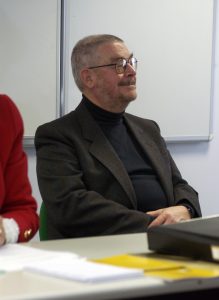This isn’t rethinking poverty
Posted on 14 Mar 2018 Categories: Blog, Responses to Rethinking Poverty
by John Veit-Wilson

In response to Barry Knight’s invitation to give feedback on his recent article ‘Rethinking Poverty: Towards the Webb Legacy’, I’m puzzled why there isn’t more emphasis on asking why everyone in society doesn’t have the resources to take an inclusive part in conventional society, as those of us who are not poor can do. And then thinking about how best to ensure that everyone does.
If we who are not poor focus on the people who suffer from not having adequate resources, it encourages the whole way of thinking about poverty to be about ‘We the People and They the Poor’, as it was expressed in the American War on Poverty in the 1970s. It’s an old problem and it’s what we call ‘othering’ people in poverty. Then it’s easy to shift the discussion into community action to mobilise ‘them’, and of course it supports Tory government talk about activating ‘them’. It’s the same old poverty of not having the adequate resources to make choices like non-poor people do, and the rethinking is just changing the colour of the wrapping paper. I thought this discussion was meant to be about power for change, not just ideals.
After all, adequate resources to make choices are the clean water of anti-poverty policy, a sine qua non, a necessary even if not sufficient condition – though quite obviously for most people they are sufficient. That’s why I think that Kate Green’s response about the role of the state in holding the power to provide the necessary conditions for us all is the right way forward, even if Barry doesn’t. Beatrice Webb herself stated that poverty has structural causes, that prevention is better than cure, and that the state is responsible for action. What’s wrong with that?
‘It encourages the whole way of thinking about poverty to be about ‘We the People and They the Poor’’
It’s a political issue. What divides the UK is that some people do want to abolish poverty, while some people want only to alleviate it while preserving their idea of the good unequal society, and some are, at present, not even willing to pay the taxation redistribution price of doing that. The evidence is all around us, and it’s much more powerful than saying that the Labour government ran out of steam, the welfare state has failed or the social scientists haven’t got the answers, as Barry does. These are contestable assertions, and need to be contested, particularly in the context of the invitation to say what a good society would look like.
If the crucial issue is how to ensure adequate resources for all, why are we asked to discuss the ‘Good Life’ at all? That’s an engaging subject in itself, but our choices and conclusions are irrelevant to other people’s – what they and all of us need before all else is adequate resources to implement our own choices. Why hasn’t everyone got them? That’s the question which needs a political answer now, not another discussion that’s already gone on for centuries.
Similarly, if community action and mobilisation are needed (it’s a both/and, not either/or), that work should first be among those non-poor social groups who even resist sharing existing resources to ensure everyone has enough to be able to make their own choices about the good life and inclusion just like the rest of us do. That means political campaigning.
‘We see the promotion of ‘rethinking’ as … a covert attempt to shift the entire public discourse away from structural politics to some people’s personal behaviour and experience’
So at a time when Barry and others are focusing on how they rethink about ‘other’ people’s poverty, some of us want the rethinking to be about politicians’ and publics’ tacit acceptance of, or even complicity in, the politics that exacerbates poverty, both individual and collective (eg services). This is an absolutely critical difference for some of us: we see the promotion of ‘rethinking’ as not just a personal evasion of dealing politically with the same old structural inequalities as before, but a covert attempt to shift the entire public discourse away from structural politics to some people’s personal behaviour and experiences. The Webbs would not have been so confused.
I look forward to hearing what Barry and the Rethinking Poverty project suggest in relation to campaigning in the next election for the abolition of austerity cuts. That would be a modest start. Discussing the Good Life and how deprived communities can cope while cuts last doesn’t rethink poverty and is not a solution to it. This project needs to rethink its politics, or come clean about them.
John Veit-Wilson is Emeritus Professor of Social Policy of Northumbria University and Guest Member of Sociology at Newcastle University.
Read Barry Knight’s piece ‘Rethinking Poverty: Towards the Webb Legacy’.
Posted on 14 Mar 2018 Categories: Blog, Responses to Rethinking Poverty
